
Response to Carbon Neutrality(CN)
One of our challenges in realizing a sustainable society is to become carbon neutral. First, in Scope 1 and 2, areas where a company can control its own emissions, we will determine how to achieve CO2 emissions reduction targets for our plants, which requires thorough daily improvements and innovative technologies. Together with automobile manufacturers and suppliers, we will promote initiatives with a view to Scope 3 and Life Cycle Assessment*(LCA).
*LCA(Life Cycle Assessment): Methodology to quantitatively assess environmental impact of the entire life cycle or at a specific stage of a product
- CO2 emissions
reduction targets for plants - Non-consolidated: 50% or more reduction as of FY2030
(vs. FY2013)
Domestic and overseas Group companies: Annual 3% reduction
(same level as non-consolidated target)
2035 Take on the challenge to achieve carbon neutrality in domestic plants
Life Cycle CO2 Reduction
In addition to CO2 emissions reduction activities at our plants, we are implementing additional initiatives from a life cycle perspective.
- Upstream
-
Scope3
-

(1)Raw materials
-

(4)Transportation
/Delivery -

(7)Commuting
*Other:(2)Capital goods,(3)Fuel and energy-related activities not included in Scope 1 and 2,(5)Waste,(6)Business travel, and(8)Leased assets
-
Reduction of CO2 emissions in materials and parts
- Reduction of materials purchased, particularly by using technologies for cold-stamped UHTSS for body parts
- Shift to eco-certified products(mufflers, exhaust manifolds, DPFs, and canisters)
- Collaboration and target setting with suppliers by rolling out our initiatives
Reduction of CO2 emissions related to distribution
- Enhancement of compatibility between suppliers and reinforcement of backup systems to optimize distribution considering regional characteristics
- Futaba
-
-
Scope1

Fuel combustion
-
Scope2

Use of electricity
-
Efforts to achieve zero CO2 emissions from plants
Daily
improvement
- Reduction of standby power
- Proper consolidation of low-use lines to keep good production efficiency(yosedome)
Innovations in production engineering
- Producing multiple parts per stamping cycle
- Change of laser welder types(CO2 → fiber)
Utility update
- Replacement of lighting to LED in plants
- Promotion of shift to inverters
Renewable
energy
- Installation of solar panels
- Downstream
-
Scope3
-

(11)Use of products
-

(12)Disposal of products
*Other:(9)Transportation/Delivery, (10)Processing of products, (13)Leased assets,(14)Franchises,(15)Investments
-
Reduction of CO2 emissions at using stage
- Weight reduction through replacement with cold-stamped UHTSS for body parts
- Shift to eco-certified products with small size and high performance, to reduce environmentally hazardous substances, noise, and weight
Efforts to reduce waste
- Reduction of waste through promotion of general-purpose use and reuse of equipment
- Incorporation of CO2 emissions into management decisions on replacement or new construction of equipment*
*We are working on replacing CO2 emissions during production with prices in the operation approval form when any equipment is to be replaced, newly constructed, or substantially renovated. We are further considering using internal carbon pricing (ICP) as an indicator for investment decisions.

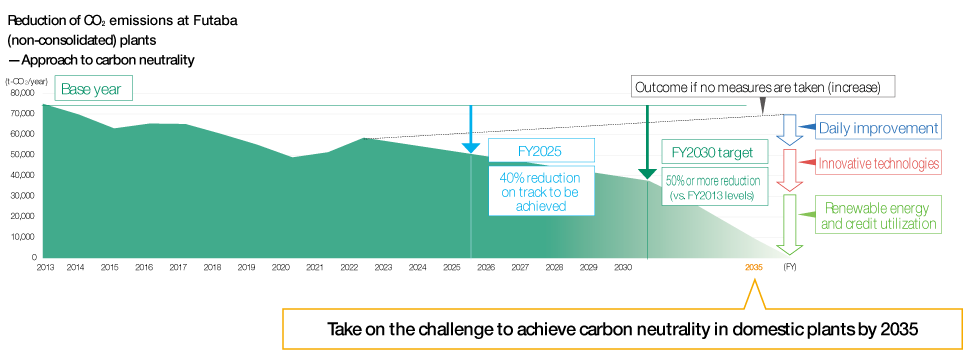
Promotion System
Futaba reports and supervises its management approach to climate change and the risks and opportunities associated with its business at our Sustainability Promotion Committee.
As one of the Company's priority issues (materiality), environmental issues including climate change are incorporated into the medium-term management plan and corporate global policy after approval by the Board of Directors, and the Company is working to achieve its goals.
The Carbon Neutrality Project Committee deliberates and establishes the Futaba Group's policies and targets, and each responsible department formulates action plans, deploys them to the Futaba Group, and manages their progress. Progress is reported to the Sustainability Promotion Committee, while improvement activities and the reexamination of targets based on changes in the business environment and business performance are discussed by the CN Project Secretariat and each responsible department, and are reflected in the policies and targets.
Promotion system chart
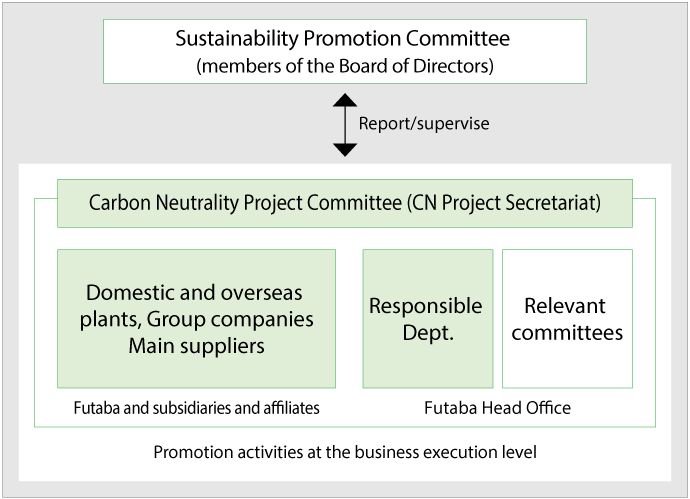
"Monozukuri" considering the impact on global warming and climate change
CO2 emissions(non-consolidated)in FY2022 ended up with reduced by 41% compared to FY2013 due to aggressive improvement activities.
Amount of CO2 emissions(non-consolidated)
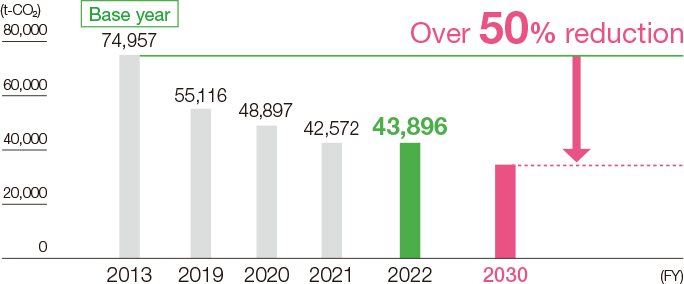
Case 1 Replacing with fiber laser welders
- We have been replacing CO2 remote laser welders in the mass production facility of instrument panel reinforcements with lower-power-consumption fiber laser welders.
We expect to cut approximately 600 tons of CO2 emissions going forward. 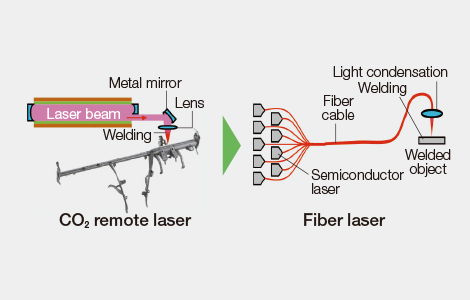
Case 2 Connecting an inverter to the main motor
- Connect an inverter to the existing main motor to adjust the motor's rotation speed and control wasteful electricity consumption.
We expect to cut approximately 800 tons of CO2 emissions when we complete connecting inverters to all the existing production equipment. 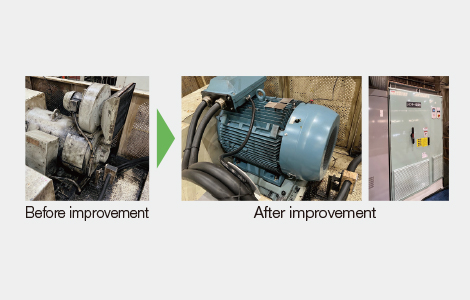
Case 3 Using renewable energy
- In August 2022, we installed solar panels at Kota Plant. The power generated by these solar panels covers approximately 60% of power consumed in the office building every month, and in the recent year (from August 2022 to July 2023), the reduction effect was 330 tons of CO₂ emissions.
Going forward, we plan to install solar panels at other plants as well as domestic and overseas Group companies. -
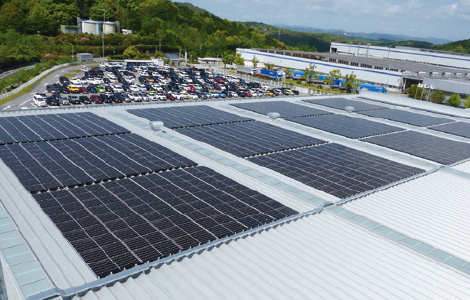
Solar panels at Koda Plant

